Person-Centered Care Principles and Nurse-Consumer Partnerships
VerifiedAdded on 2023/01/10
|8
|2099
|96
Essay
AI Summary
This essay delves into the core principles of Person-Centered Care (PCC), emphasizing the patient's central role in their own care. It explores eight key principles, including respect for patient preferences, care coordination, emotional and physical comfort, family involvement, and access to care. The essay examines how nurses can effectively partner with consumers by demonstrating cultural sensitivity, employing strong communication skills, and advocating for patient needs. It highlights the importance of informed consent, patient autonomy, and the ethical considerations within PCC. The discussion covers how these strategies improve patient satisfaction, self-management, and adherence to treatment, ultimately leading to enhanced patient safety and quality of care. The essay concludes by emphasizing the importance of PCC skills for nursing students and their contribution to quality improvement in healthcare settings. The essay provides a detailed overview of PCC, its principles, and the nurses' role in partnership with consumers for better patient outcomes.

Running head: NURSING
Nursing
Name of the student:
Name of the University:
Author’s note
Nursing
Name of the student:
Name of the University:
Author’s note
Paraphrase This Document
Need a fresh take? Get an instant paraphrase of this document with our AI Paraphraser
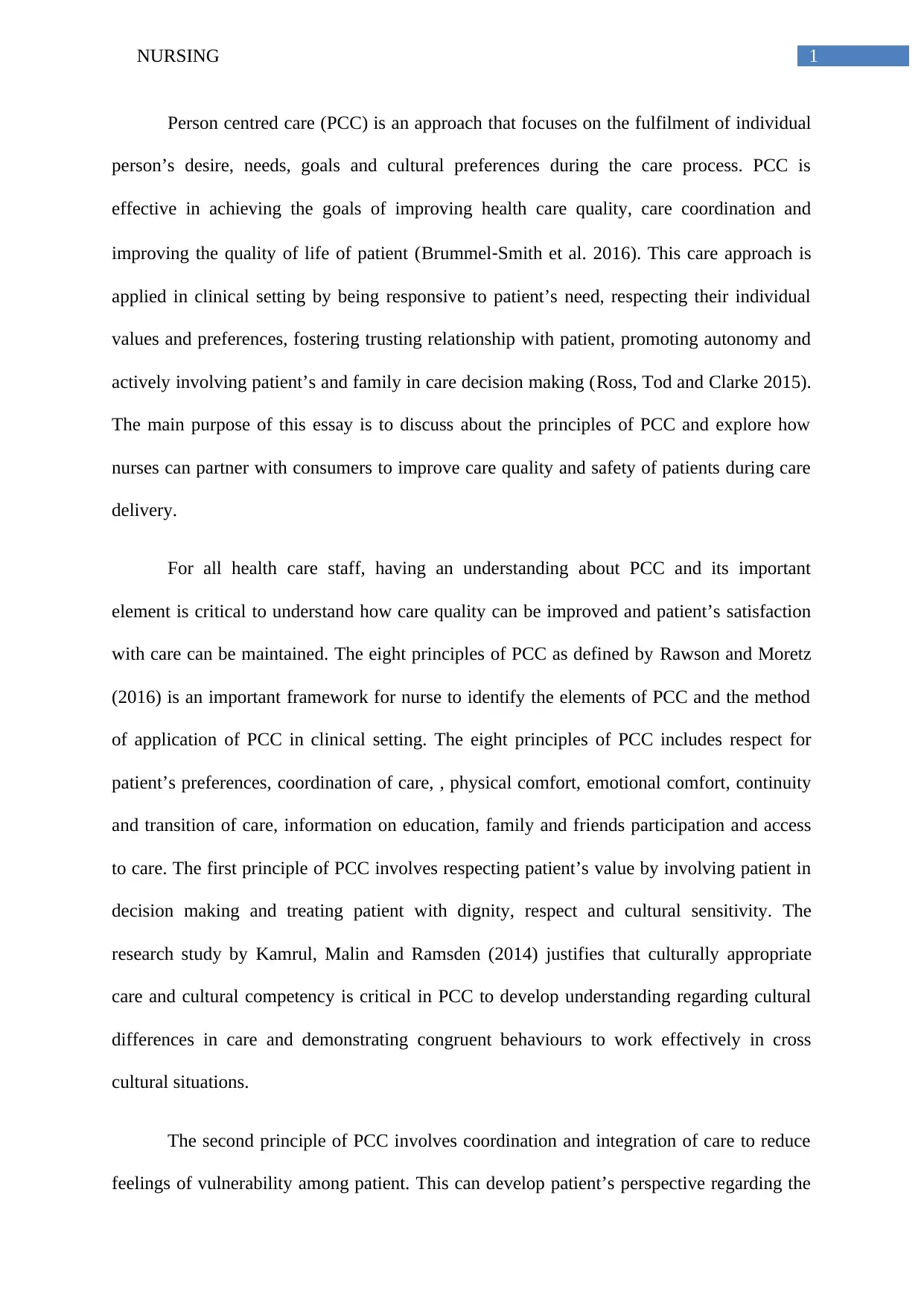
1NURSING
Person centred care (PCC) is an approach that focuses on the fulfilment of individual
person’s desire, needs, goals and cultural preferences during the care process. PCC is
effective in achieving the goals of improving health care quality, care coordination and
improving the quality of life of patient (Brummel‐Smith et al. 2016). This care approach is
applied in clinical setting by being responsive to patient’s need, respecting their individual
values and preferences, fostering trusting relationship with patient, promoting autonomy and
actively involving patient’s and family in care decision making (Ross, Tod and Clarke 2015).
The main purpose of this essay is to discuss about the principles of PCC and explore how
nurses can partner with consumers to improve care quality and safety of patients during care
delivery.
For all health care staff, having an understanding about PCC and its important
element is critical to understand how care quality can be improved and patient’s satisfaction
with care can be maintained. The eight principles of PCC as defined by Rawson and Moretz
(2016) is an important framework for nurse to identify the elements of PCC and the method
of application of PCC in clinical setting. The eight principles of PCC includes respect for
patient’s preferences, coordination of care, , physical comfort, emotional comfort, continuity
and transition of care, information on education, family and friends participation and access
to care. The first principle of PCC involves respecting patient’s value by involving patient in
decision making and treating patient with dignity, respect and cultural sensitivity. The
research study by Kamrul, Malin and Ramsden (2014) justifies that culturally appropriate
care and cultural competency is critical in PCC to develop understanding regarding cultural
differences in care and demonstrating congruent behaviours to work effectively in cross
cultural situations.
The second principle of PCC involves coordination and integration of care to reduce
feelings of vulnerability among patient. This can develop patient’s perspective regarding the
Person centred care (PCC) is an approach that focuses on the fulfilment of individual
person’s desire, needs, goals and cultural preferences during the care process. PCC is
effective in achieving the goals of improving health care quality, care coordination and
improving the quality of life of patient (Brummel‐Smith et al. 2016). This care approach is
applied in clinical setting by being responsive to patient’s need, respecting their individual
values and preferences, fostering trusting relationship with patient, promoting autonomy and
actively involving patient’s and family in care decision making (Ross, Tod and Clarke 2015).
The main purpose of this essay is to discuss about the principles of PCC and explore how
nurses can partner with consumers to improve care quality and safety of patients during care
delivery.
For all health care staff, having an understanding about PCC and its important
element is critical to understand how care quality can be improved and patient’s satisfaction
with care can be maintained. The eight principles of PCC as defined by Rawson and Moretz
(2016) is an important framework for nurse to identify the elements of PCC and the method
of application of PCC in clinical setting. The eight principles of PCC includes respect for
patient’s preferences, coordination of care, , physical comfort, emotional comfort, continuity
and transition of care, information on education, family and friends participation and access
to care. The first principle of PCC involves respecting patient’s value by involving patient in
decision making and treating patient with dignity, respect and cultural sensitivity. The
research study by Kamrul, Malin and Ramsden (2014) justifies that culturally appropriate
care and cultural competency is critical in PCC to develop understanding regarding cultural
differences in care and demonstrating congruent behaviours to work effectively in cross
cultural situations.
The second principle of PCC involves coordination and integration of care to reduce
feelings of vulnerability among patient. This can develop patient’s perspective regarding the
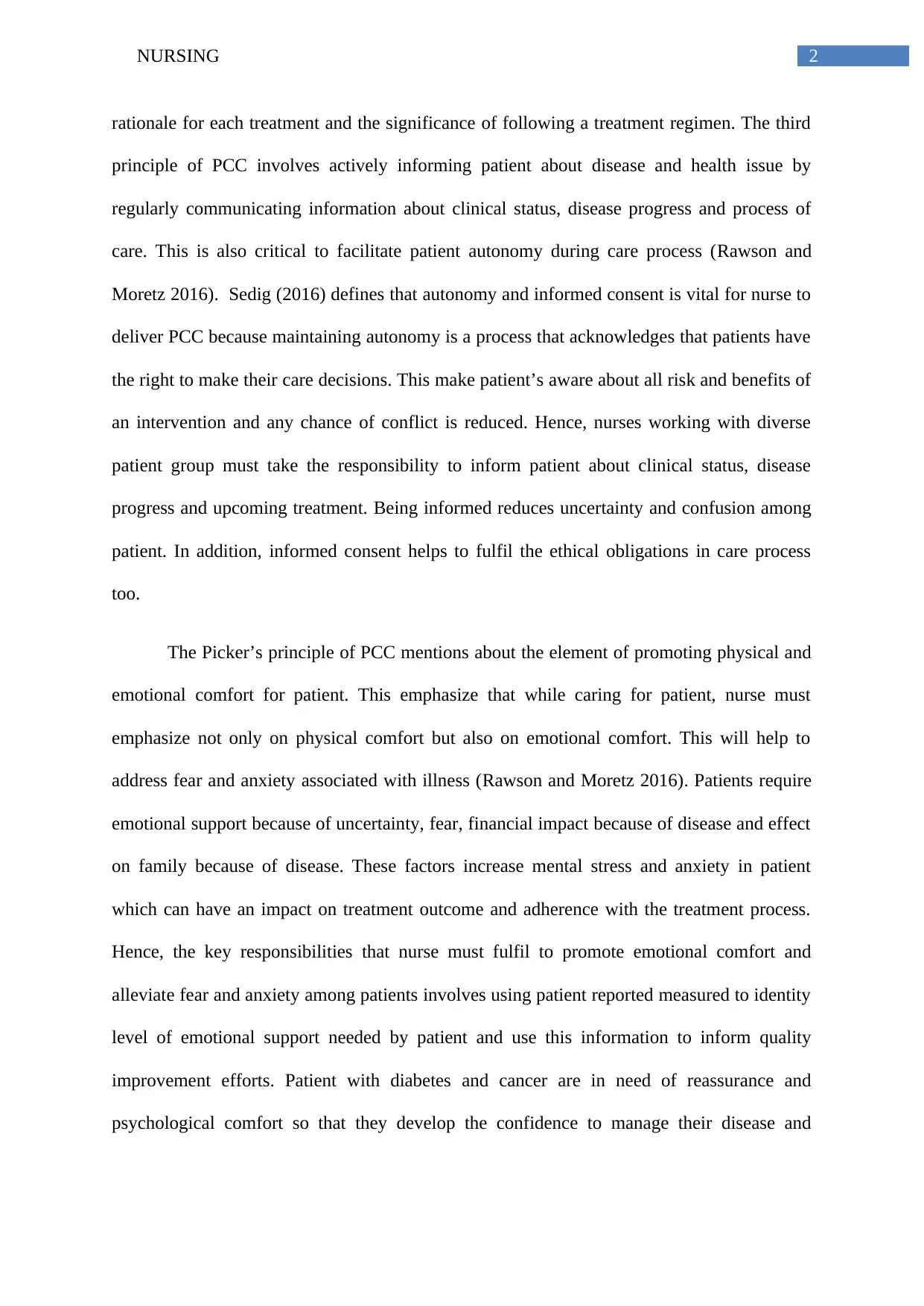
2NURSING
rationale for each treatment and the significance of following a treatment regimen. The third
principle of PCC involves actively informing patient about disease and health issue by
regularly communicating information about clinical status, disease progress and process of
care. This is also critical to facilitate patient autonomy during care process (Rawson and
Moretz 2016). Sedig (2016) defines that autonomy and informed consent is vital for nurse to
deliver PCC because maintaining autonomy is a process that acknowledges that patients have
the right to make their care decisions. This make patient’s aware about all risk and benefits of
an intervention and any chance of conflict is reduced. Hence, nurses working with diverse
patient group must take the responsibility to inform patient about clinical status, disease
progress and upcoming treatment. Being informed reduces uncertainty and confusion among
patient. In addition, informed consent helps to fulfil the ethical obligations in care process
too.
The Picker’s principle of PCC mentions about the element of promoting physical and
emotional comfort for patient. This emphasize that while caring for patient, nurse must
emphasize not only on physical comfort but also on emotional comfort. This will help to
address fear and anxiety associated with illness (Rawson and Moretz 2016). Patients require
emotional support because of uncertainty, fear, financial impact because of disease and effect
on family because of disease. These factors increase mental stress and anxiety in patient
which can have an impact on treatment outcome and adherence with the treatment process.
Hence, the key responsibilities that nurse must fulfil to promote emotional comfort and
alleviate fear and anxiety among patients involves using patient reported measured to identity
level of emotional support needed by patient and use this information to inform quality
improvement efforts. Patient with diabetes and cancer are in need of reassurance and
psychological comfort so that they develop the confidence to manage their disease and
rationale for each treatment and the significance of following a treatment regimen. The third
principle of PCC involves actively informing patient about disease and health issue by
regularly communicating information about clinical status, disease progress and process of
care. This is also critical to facilitate patient autonomy during care process (Rawson and
Moretz 2016). Sedig (2016) defines that autonomy and informed consent is vital for nurse to
deliver PCC because maintaining autonomy is a process that acknowledges that patients have
the right to make their care decisions. This make patient’s aware about all risk and benefits of
an intervention and any chance of conflict is reduced. Hence, nurses working with diverse
patient group must take the responsibility to inform patient about clinical status, disease
progress and upcoming treatment. Being informed reduces uncertainty and confusion among
patient. In addition, informed consent helps to fulfil the ethical obligations in care process
too.
The Picker’s principle of PCC mentions about the element of promoting physical and
emotional comfort for patient. This emphasize that while caring for patient, nurse must
emphasize not only on physical comfort but also on emotional comfort. This will help to
address fear and anxiety associated with illness (Rawson and Moretz 2016). Patients require
emotional support because of uncertainty, fear, financial impact because of disease and effect
on family because of disease. These factors increase mental stress and anxiety in patient
which can have an impact on treatment outcome and adherence with the treatment process.
Hence, the key responsibilities that nurse must fulfil to promote emotional comfort and
alleviate fear and anxiety among patients involves using patient reported measured to identity
level of emotional support needed by patient and use this information to inform quality
improvement efforts. Patient with diabetes and cancer are in need of reassurance and
psychological comfort so that they develop the confidence to manage their disease and
⊘ This is a preview!⊘
Do you want full access?
Subscribe today to unlock all pages.

Trusted by 1+ million students worldwide
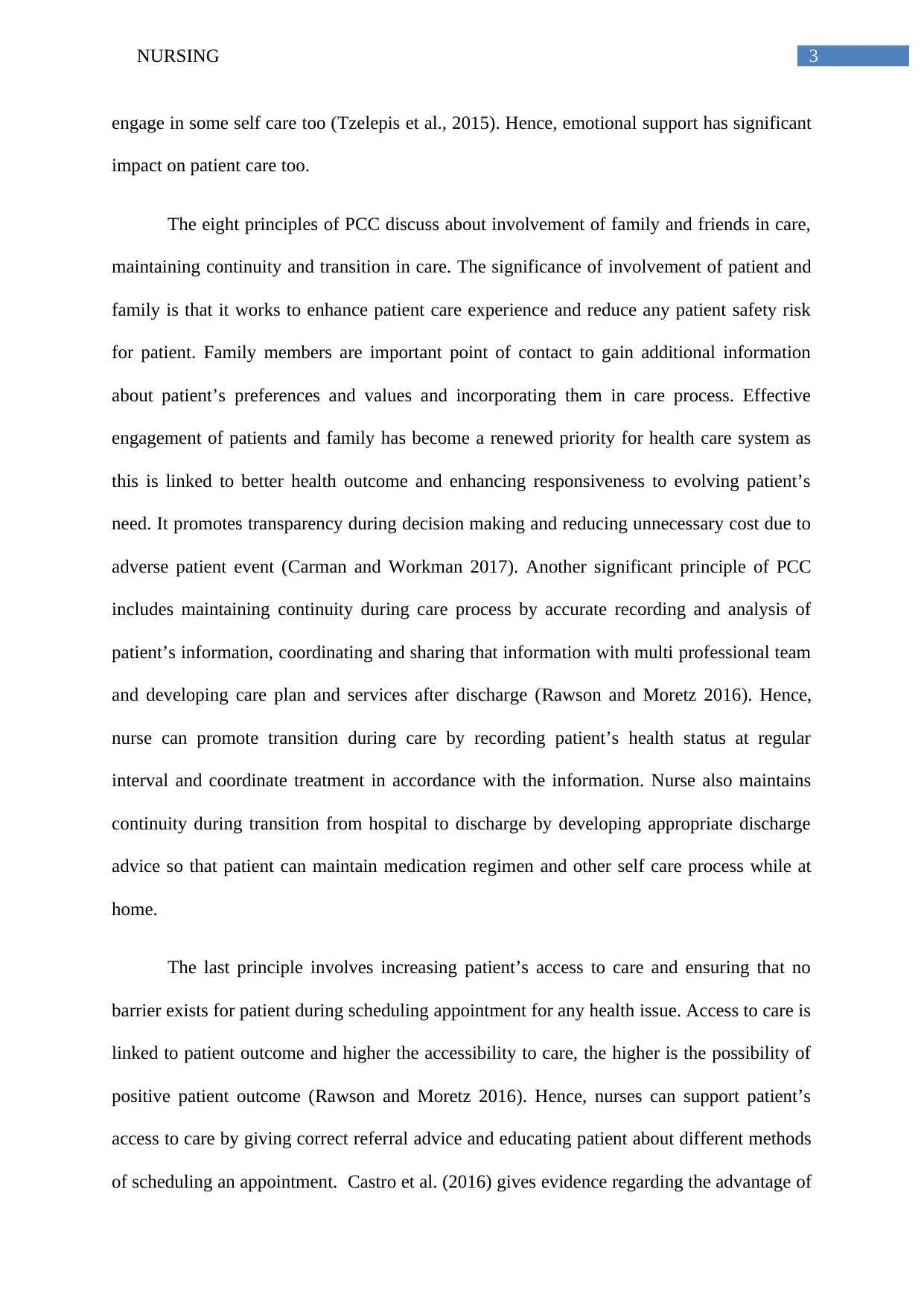
3NURSING
engage in some self care too (Tzelepis et al., 2015). Hence, emotional support has significant
impact on patient care too.
The eight principles of PCC discuss about involvement of family and friends in care,
maintaining continuity and transition in care. The significance of involvement of patient and
family is that it works to enhance patient care experience and reduce any patient safety risk
for patient. Family members are important point of contact to gain additional information
about patient’s preferences and values and incorporating them in care process. Effective
engagement of patients and family has become a renewed priority for health care system as
this is linked to better health outcome and enhancing responsiveness to evolving patient’s
need. It promotes transparency during decision making and reducing unnecessary cost due to
adverse patient event (Carman and Workman 2017). Another significant principle of PCC
includes maintaining continuity during care process by accurate recording and analysis of
patient’s information, coordinating and sharing that information with multi professional team
and developing care plan and services after discharge (Rawson and Moretz 2016). Hence,
nurse can promote transition during care by recording patient’s health status at regular
interval and coordinate treatment in accordance with the information. Nurse also maintains
continuity during transition from hospital to discharge by developing appropriate discharge
advice so that patient can maintain medication regimen and other self care process while at
home.
The last principle involves increasing patient’s access to care and ensuring that no
barrier exists for patient during scheduling appointment for any health issue. Access to care is
linked to patient outcome and higher the accessibility to care, the higher is the possibility of
positive patient outcome (Rawson and Moretz 2016). Hence, nurses can support patient’s
access to care by giving correct referral advice and educating patient about different methods
of scheduling an appointment. Castro et al. (2016) gives evidence regarding the advantage of
engage in some self care too (Tzelepis et al., 2015). Hence, emotional support has significant
impact on patient care too.
The eight principles of PCC discuss about involvement of family and friends in care,
maintaining continuity and transition in care. The significance of involvement of patient and
family is that it works to enhance patient care experience and reduce any patient safety risk
for patient. Family members are important point of contact to gain additional information
about patient’s preferences and values and incorporating them in care process. Effective
engagement of patients and family has become a renewed priority for health care system as
this is linked to better health outcome and enhancing responsiveness to evolving patient’s
need. It promotes transparency during decision making and reducing unnecessary cost due to
adverse patient event (Carman and Workman 2017). Another significant principle of PCC
includes maintaining continuity during care process by accurate recording and analysis of
patient’s information, coordinating and sharing that information with multi professional team
and developing care plan and services after discharge (Rawson and Moretz 2016). Hence,
nurse can promote transition during care by recording patient’s health status at regular
interval and coordinate treatment in accordance with the information. Nurse also maintains
continuity during transition from hospital to discharge by developing appropriate discharge
advice so that patient can maintain medication regimen and other self care process while at
home.
The last principle involves increasing patient’s access to care and ensuring that no
barrier exists for patient during scheduling appointment for any health issue. Access to care is
linked to patient outcome and higher the accessibility to care, the higher is the possibility of
positive patient outcome (Rawson and Moretz 2016). Hence, nurses can support patient’s
access to care by giving correct referral advice and educating patient about different methods
of scheduling an appointment. Castro et al. (2016) gives evidence regarding the advantage of
Paraphrase This Document
Need a fresh take? Get an instant paraphrase of this document with our AI Paraphraser
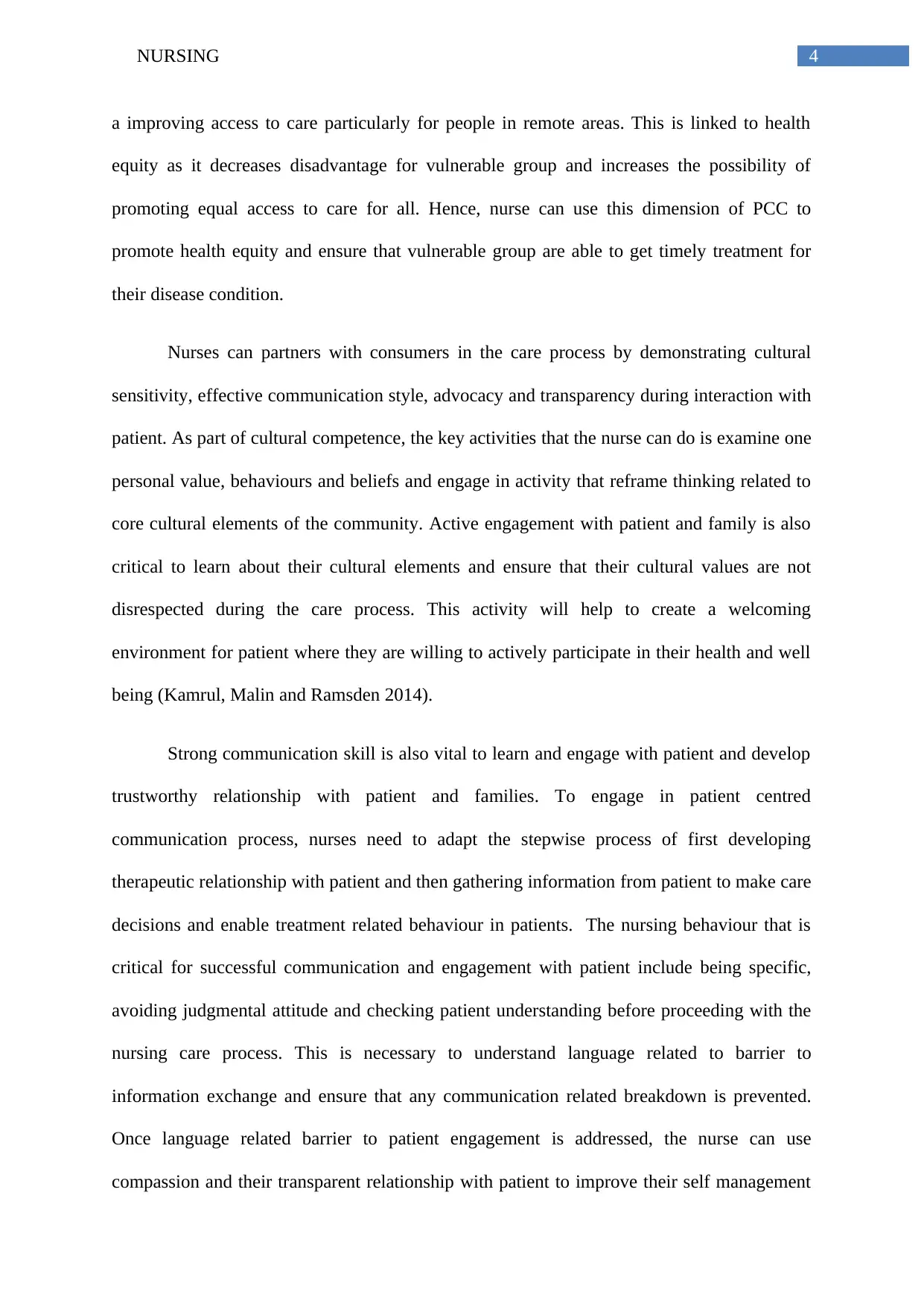
4NURSING
a improving access to care particularly for people in remote areas. This is linked to health
equity as it decreases disadvantage for vulnerable group and increases the possibility of
promoting equal access to care for all. Hence, nurse can use this dimension of PCC to
promote health equity and ensure that vulnerable group are able to get timely treatment for
their disease condition.
Nurses can partners with consumers in the care process by demonstrating cultural
sensitivity, effective communication style, advocacy and transparency during interaction with
patient. As part of cultural competence, the key activities that the nurse can do is examine one
personal value, behaviours and beliefs and engage in activity that reframe thinking related to
core cultural elements of the community. Active engagement with patient and family is also
critical to learn about their cultural elements and ensure that their cultural values are not
disrespected during the care process. This activity will help to create a welcoming
environment for patient where they are willing to actively participate in their health and well
being (Kamrul, Malin and Ramsden 2014).
Strong communication skill is also vital to learn and engage with patient and develop
trustworthy relationship with patient and families. To engage in patient centred
communication process, nurses need to adapt the stepwise process of first developing
therapeutic relationship with patient and then gathering information from patient to make care
decisions and enable treatment related behaviour in patients. The nursing behaviour that is
critical for successful communication and engagement with patient include being specific,
avoiding judgmental attitude and checking patient understanding before proceeding with the
nursing care process. This is necessary to understand language related to barrier to
information exchange and ensure that any communication related breakdown is prevented.
Once language related barrier to patient engagement is addressed, the nurse can use
compassion and their transparent relationship with patient to improve their self management
a improving access to care particularly for people in remote areas. This is linked to health
equity as it decreases disadvantage for vulnerable group and increases the possibility of
promoting equal access to care for all. Hence, nurse can use this dimension of PCC to
promote health equity and ensure that vulnerable group are able to get timely treatment for
their disease condition.
Nurses can partners with consumers in the care process by demonstrating cultural
sensitivity, effective communication style, advocacy and transparency during interaction with
patient. As part of cultural competence, the key activities that the nurse can do is examine one
personal value, behaviours and beliefs and engage in activity that reframe thinking related to
core cultural elements of the community. Active engagement with patient and family is also
critical to learn about their cultural elements and ensure that their cultural values are not
disrespected during the care process. This activity will help to create a welcoming
environment for patient where they are willing to actively participate in their health and well
being (Kamrul, Malin and Ramsden 2014).
Strong communication skill is also vital to learn and engage with patient and develop
trustworthy relationship with patient and families. To engage in patient centred
communication process, nurses need to adapt the stepwise process of first developing
therapeutic relationship with patient and then gathering information from patient to make care
decisions and enable treatment related behaviour in patients. The nursing behaviour that is
critical for successful communication and engagement with patient include being specific,
avoiding judgmental attitude and checking patient understanding before proceeding with the
nursing care process. This is necessary to understand language related to barrier to
information exchange and ensure that any communication related breakdown is prevented.
Once language related barrier to patient engagement is addressed, the nurse can use
compassion and their transparent relationship with patient to improve their self management
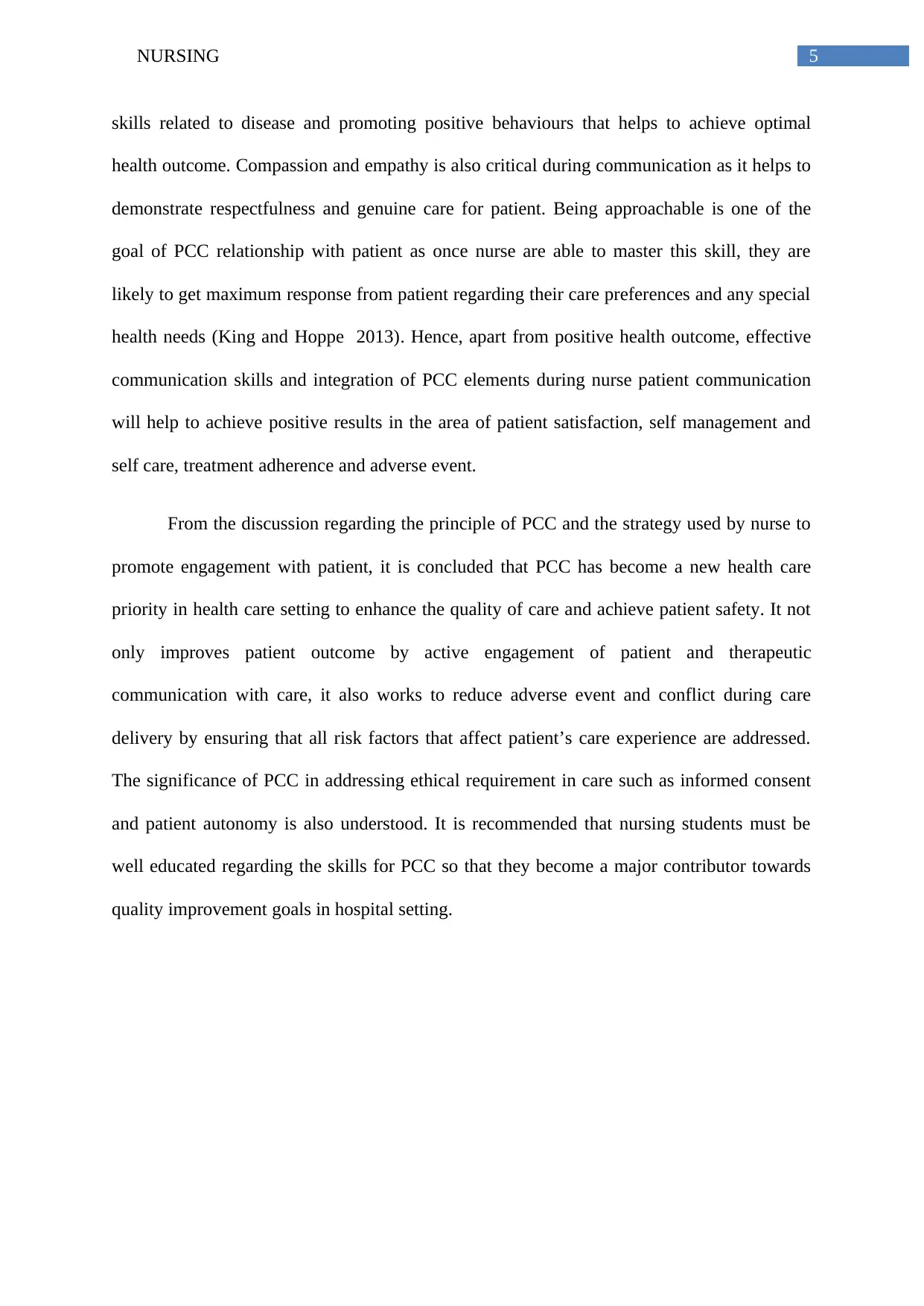
5NURSING
skills related to disease and promoting positive behaviours that helps to achieve optimal
health outcome. Compassion and empathy is also critical during communication as it helps to
demonstrate respectfulness and genuine care for patient. Being approachable is one of the
goal of PCC relationship with patient as once nurse are able to master this skill, they are
likely to get maximum response from patient regarding their care preferences and any special
health needs (King and Hoppe 2013). Hence, apart from positive health outcome, effective
communication skills and integration of PCC elements during nurse patient communication
will help to achieve positive results in the area of patient satisfaction, self management and
self care, treatment adherence and adverse event.
From the discussion regarding the principle of PCC and the strategy used by nurse to
promote engagement with patient, it is concluded that PCC has become a new health care
priority in health care setting to enhance the quality of care and achieve patient safety. It not
only improves patient outcome by active engagement of patient and therapeutic
communication with care, it also works to reduce adverse event and conflict during care
delivery by ensuring that all risk factors that affect patient’s care experience are addressed.
The significance of PCC in addressing ethical requirement in care such as informed consent
and patient autonomy is also understood. It is recommended that nursing students must be
well educated regarding the skills for PCC so that they become a major contributor towards
quality improvement goals in hospital setting.
skills related to disease and promoting positive behaviours that helps to achieve optimal
health outcome. Compassion and empathy is also critical during communication as it helps to
demonstrate respectfulness and genuine care for patient. Being approachable is one of the
goal of PCC relationship with patient as once nurse are able to master this skill, they are
likely to get maximum response from patient regarding their care preferences and any special
health needs (King and Hoppe 2013). Hence, apart from positive health outcome, effective
communication skills and integration of PCC elements during nurse patient communication
will help to achieve positive results in the area of patient satisfaction, self management and
self care, treatment adherence and adverse event.
From the discussion regarding the principle of PCC and the strategy used by nurse to
promote engagement with patient, it is concluded that PCC has become a new health care
priority in health care setting to enhance the quality of care and achieve patient safety. It not
only improves patient outcome by active engagement of patient and therapeutic
communication with care, it also works to reduce adverse event and conflict during care
delivery by ensuring that all risk factors that affect patient’s care experience are addressed.
The significance of PCC in addressing ethical requirement in care such as informed consent
and patient autonomy is also understood. It is recommended that nursing students must be
well educated regarding the skills for PCC so that they become a major contributor towards
quality improvement goals in hospital setting.
⊘ This is a preview!⊘
Do you want full access?
Subscribe today to unlock all pages.

Trusted by 1+ million students worldwide
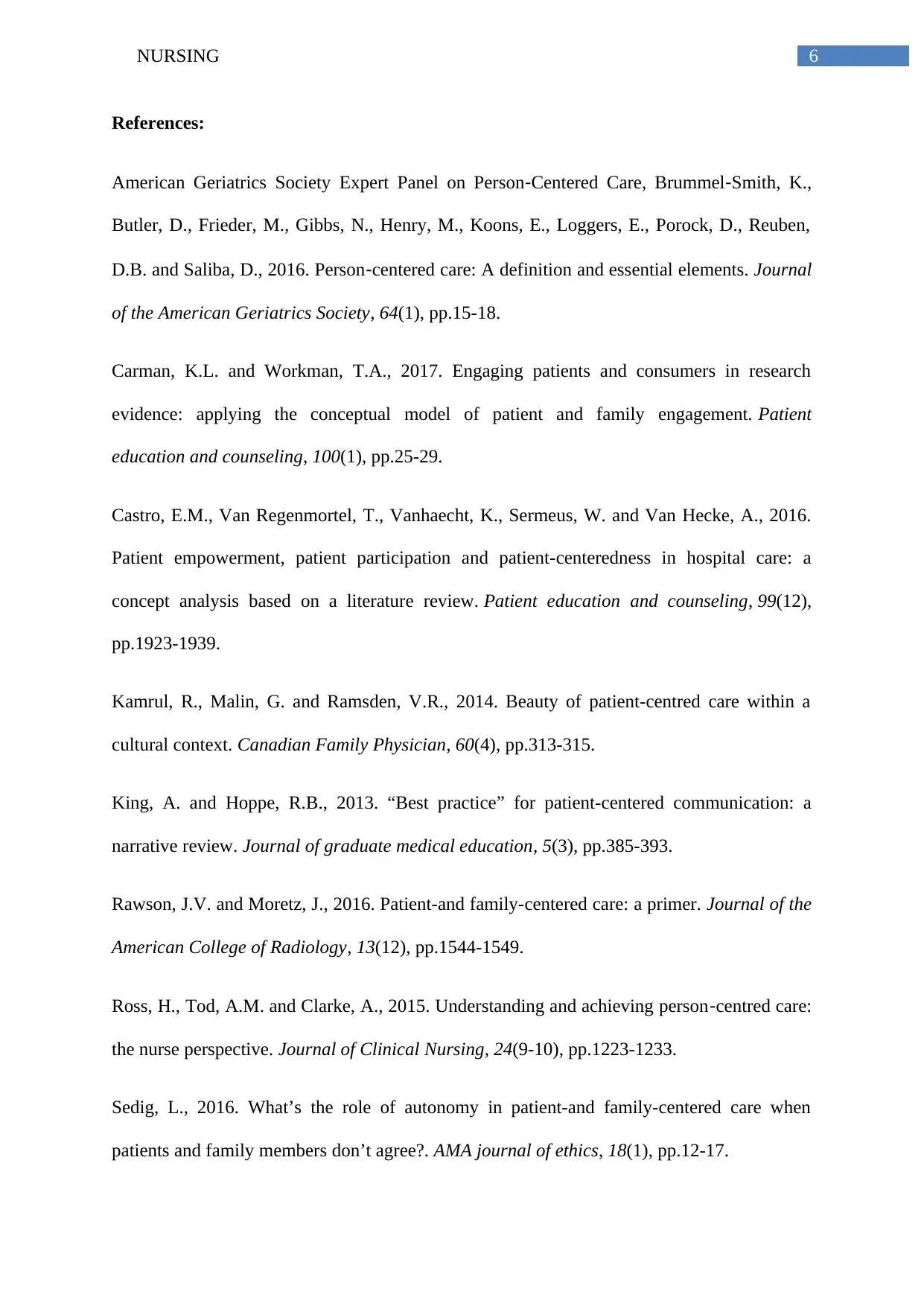
6NURSING
References:
American Geriatrics Society Expert Panel on Person‐Centered Care, Brummel‐Smith, K.,
Butler, D., Frieder, M., Gibbs, N., Henry, M., Koons, E., Loggers, E., Porock, D., Reuben,
D.B. and Saliba, D., 2016. Person‐centered care: A definition and essential elements. Journal
of the American Geriatrics Society, 64(1), pp.15-18.
Carman, K.L. and Workman, T.A., 2017. Engaging patients and consumers in research
evidence: applying the conceptual model of patient and family engagement. Patient
education and counseling, 100(1), pp.25-29.
Castro, E.M., Van Regenmortel, T., Vanhaecht, K., Sermeus, W. and Van Hecke, A., 2016.
Patient empowerment, patient participation and patient-centeredness in hospital care: a
concept analysis based on a literature review. Patient education and counseling, 99(12),
pp.1923-1939.
Kamrul, R., Malin, G. and Ramsden, V.R., 2014. Beauty of patient-centred care within a
cultural context. Canadian Family Physician, 60(4), pp.313-315.
King, A. and Hoppe, R.B., 2013. “Best practice” for patient-centered communication: a
narrative review. Journal of graduate medical education, 5(3), pp.385-393.
Rawson, J.V. and Moretz, J., 2016. Patient-and family-centered care: a primer. Journal of the
American College of Radiology, 13(12), pp.1544-1549.
Ross, H., Tod, A.M. and Clarke, A., 2015. Understanding and achieving person‐centred care:
the nurse perspective. Journal of Clinical Nursing, 24(9-10), pp.1223-1233.
Sedig, L., 2016. What’s the role of autonomy in patient-and family-centered care when
patients and family members don’t agree?. AMA journal of ethics, 18(1), pp.12-17.
References:
American Geriatrics Society Expert Panel on Person‐Centered Care, Brummel‐Smith, K.,
Butler, D., Frieder, M., Gibbs, N., Henry, M., Koons, E., Loggers, E., Porock, D., Reuben,
D.B. and Saliba, D., 2016. Person‐centered care: A definition and essential elements. Journal
of the American Geriatrics Society, 64(1), pp.15-18.
Carman, K.L. and Workman, T.A., 2017. Engaging patients and consumers in research
evidence: applying the conceptual model of patient and family engagement. Patient
education and counseling, 100(1), pp.25-29.
Castro, E.M., Van Regenmortel, T., Vanhaecht, K., Sermeus, W. and Van Hecke, A., 2016.
Patient empowerment, patient participation and patient-centeredness in hospital care: a
concept analysis based on a literature review. Patient education and counseling, 99(12),
pp.1923-1939.
Kamrul, R., Malin, G. and Ramsden, V.R., 2014. Beauty of patient-centred care within a
cultural context. Canadian Family Physician, 60(4), pp.313-315.
King, A. and Hoppe, R.B., 2013. “Best practice” for patient-centered communication: a
narrative review. Journal of graduate medical education, 5(3), pp.385-393.
Rawson, J.V. and Moretz, J., 2016. Patient-and family-centered care: a primer. Journal of the
American College of Radiology, 13(12), pp.1544-1549.
Ross, H., Tod, A.M. and Clarke, A., 2015. Understanding and achieving person‐centred care:
the nurse perspective. Journal of Clinical Nursing, 24(9-10), pp.1223-1233.
Sedig, L., 2016. What’s the role of autonomy in patient-and family-centered care when
patients and family members don’t agree?. AMA journal of ethics, 18(1), pp.12-17.
Paraphrase This Document
Need a fresh take? Get an instant paraphrase of this document with our AI Paraphraser

7NURSING
Tzelepis, F., Sanson-Fisher, R.W., Zucca, A.C. and Fradgley, E.A., 2015. Measuring the
quality of patient-centered care: why patient-reported measures are critical to reliable
assessment. Patient preference and adherence, 9, p.831.
Tzelepis, F., Sanson-Fisher, R.W., Zucca, A.C. and Fradgley, E.A., 2015. Measuring the
quality of patient-centered care: why patient-reported measures are critical to reliable
assessment. Patient preference and adherence, 9, p.831.
1 out of 8
Related Documents
Your All-in-One AI-Powered Toolkit for Academic Success.
+13062052269
info@desklib.com
Available 24*7 on WhatsApp / Email
![[object Object]](/_next/static/media/star-bottom.7253800d.svg)
Unlock your academic potential
Copyright © 2020–2026 A2Z Services. All Rights Reserved. Developed and managed by ZUCOL.





